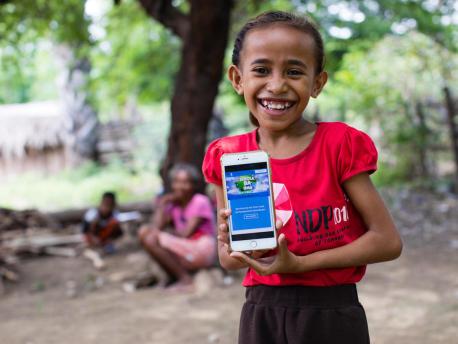
Online Learning Platform Expanded for Global Students
Created by UNICEF, Microsoft and the University of Cambridge, the Learning Passport provides key resources to help children and youth continue their education at home while schools and learning centers are closed around the world during the novel coronavirus outbreak.
Schools have closed in more than 190 countries to prevent the spread of the novel coronavirus, disrupting the educations of more than 1.5 billion students. To help children and youth continue their education at home during this unprecedented time, UNICEF and Microsoft have accelerated access to an online learning platform originally designed to provide education for displaced and refugee children and youth.
Kosovo, Timor-Leste and Ukraine are the first countries to roll out their online curriculum through the Learning Passport
A partnership between UNICEF, Microsoft Corp. and the University of Cambridge, the Learning Passport has been scaled up to facilitate country-level curriculum and provide key resources to teachers and educators. Kosovo, Timor-Leste and Ukraine are the first countries to roll out their online curriculum through the platform.

On April 14, 2020 in Timor-Leste, a boy talks with his grandmother about the book he's reading. The book is part of a series of audiovisual and printed material produced by the Ministry of Education and UNICEF to help children continue learning in line with school curriculum during ongoing school closures. Students in Timor-Leste with internet access at home can find a digital version of the book on the Learning Passport platform developed by Microsoft, UNICEF and the University of Cambridge. © UNICEF/UNI320756/Soares
"From school closures, to isolation, to a persistent sense of fear and anxiety, the effects of this pandemic are impacting childhoods worldwide," said UNICEF Executive Director Henrietta Fore. "We need to come together and explore every avenue to help our children through this difficult time. And with partners like Microsoft, we are able to swiftly deploy innovative, scalable solutions for children and youth. The adaptations made to the Learning Passport are a powerful reminder of what we can achieve together with our partners for children as the crisis deepens globally."
We need to come together and explore every avenue to help our children through this difficult time. — Henrietta Fore, UNICEF Executive Director
In development for more than 18 months, the Learning Passport underwent rapid expansion of its reach to meet the needs of children during the current crisis. Countries with digital curriculum can now facilitate remote learning for children and youth who have an internet connection and access to a device such as a mobile phone, tablet, laptop or computer at home.

On April 15, 2020 in Kyiv, Ukraine, Zlata, 7, works on schoolwork from home. All schools in the country are closed as part of measures to combat the spread of COVID-19. © UNICEF/UNI321760/Filippov
Children and young people continuing their education online can do so through a country-specific platform. Each country's platform provides a digitized curriculum with textbooks and a selection of supplemental content, in national languages, that is jointly curated at country level to best serve learners' and educators' specific needs. The Learning Passport keeps track of every curriculum subject each student learns and guides learners with little additional support required.
The Learning Passport is part of the Generation Unlimited Global Breakthroughs on Remote Learning and Work and Portable Certification that aim to use technology to address challenges faced by learners, facilitators and education providers, particularly in conflict-affected and humanitarian settings. Generation Unlimited is a global multi-sector partnership to meet the urgent need for expanded education, training and employment opportunities for young people.
Read more about how UNICEF is helping kids adjust to online learning during the coronavirus pandemic.
Your donation will help UNICEF be there for vulnerable children during the COVID-19 outbreak.
Top photo: On April 14, 2020 in Timor-Leste, a girl shows off the Learning Passport online platform on which children and parents can access a range of audiovisual materials to help students continue learning at home during ongoing school closures. The Learning Passport was developed by Microsoft, UNICEF and the University of Cambridge. Schools in Timor-Leste have been closed since March 23 to prevent the spread of COVID-19. © UNICEF/UNI320754/Soares
HOW TO HELP
There are many ways to make a difference
War, famine, poverty, natural disasters — threats to the world's children keep coming. But UNICEF won't stop working to keep children healthy and safe.
UNICEF works in over 190 countries and territories — more places than any other children's organization. UNICEF has the world's largest humanitarian warehouse and, when disaster strikes, can get supplies almost anywhere within 72 hours. Constantly innovating, always advocating for a better world for children, UNICEF works to ensure that every child can grow up healthy, educated, protected and respected.
Would you like to help give all children the opportunity to reach their full potential? There are many ways to get involved.





